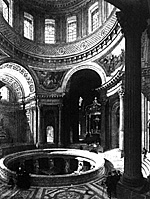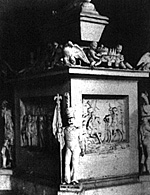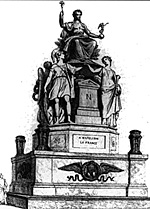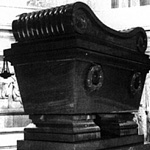

According to many authors of the period, by 1830, mediocrity had, except for a few small bastions of liberal dissent, settled over most of France. To many in France Napoleon Bon-aparte was both a Prometheus and an Alexander the Great, a man who not only challenged the monarchs who ruled Europe in his time, but conquered them. That recent past was beginning to look more and more glorious.
In the following poem describing the funeral procession carrying Napoleon's body through Paris on a cold December day in 1840, Heinrich Heine, a German Jew and one of the greatest poets of the German romantic movement, suggests the ennui of not only Louis-Philippe's reign but also of the Bourbon restoration that preceded it. It captures, through symbolic use of the dismal weather, a decadent and dispirited people who could dream about a magnificent past, but no longer had the strength or courage to live it.
|
We drove through Mulhein: a pretty town; Its people got things done. I saw them last in the month of May, In Eighteen Thirty-One Everything then was blossom-crowned; Sunbeams were laughing then; Full of longing sang the birds; And there were hopeful men. "Soon the lean barons will ride away," The people used to think, "And long-necked bottles will be drained For a departing drink. "And Freedom will come with song and dance, With her banner, the white-blue-red; Perhaps she'll even be able to fetch Napoleon from the dead." My God! the barons are still here! And many who came this way-- Gawky fellows, dry as bone-- Carry big bellies today. They looked like Love and Faith and Hope, Those pale invading swine; Since then their noses have grown red From too much German wine. And Freedom has sprained an ankle--no more Can she leap as in other days. From the towers of Paris the tricolor droops With a melancholy gaze. Since then the Emperor's risen again, But he had been taught to behave By the English worms; with his own consent Once more he's laid in the grave. I saw his funeral myself, And the coach that solemnly rolled With the golden Victory Goddesses Who carried the coffin of gold. All along the Champs Elysees, And through the Triumphal Arch, Right through the mist, right over the snow, Advanced the funeral march. The music was shockingly dissonant; The musicians numb with frost. The eagles on the standards seemed Sorrowful and lost. And the people were lost in memories, So ghastly did they seem! Once again was conjured up Their old imperial dream. I couldn't help but weep that day: My eyes grew dim with tears When that old cry, Vive l'Empereur!" Resounded in my ears. from part VIII of the poem "Germany" by Heinrich Heine |
 Plaster production of Louis Auvray's losing entry into the tomb contest. Some 80 designs were submitted. |
 Louis Petitot's losing entry in the intrigue-plagued contest to design a tomb for the late Napoleon. | |
 The winning design for the sarcophagus of Napoleon. The sarcophagus rests in the "basement" of Les Invalides. An opening in the first floor allows viewing, and a stairway at the back allows a closer look. |
Back to review of As Befits a Legend: Building a Tomb for Napoleon
Other Book Reviews
- The Culture of Clothing: Dress and Fashion in the Ancien Regime
- The Art of Dress: Fashion in England and France 1750-1820
- Napoleon's Traitor: The Masons and Marshal Ney's Mysterious Escape
Back to Table of Contents -- Napoleon #5
© Copyright 1996 by Emperor's Press.
This article appears in MagWeb (Magazine Web) on the Internet World Wide Web.
The full text and graphics from other military history magazines and gaming magazines are available at http://www.magweb.com